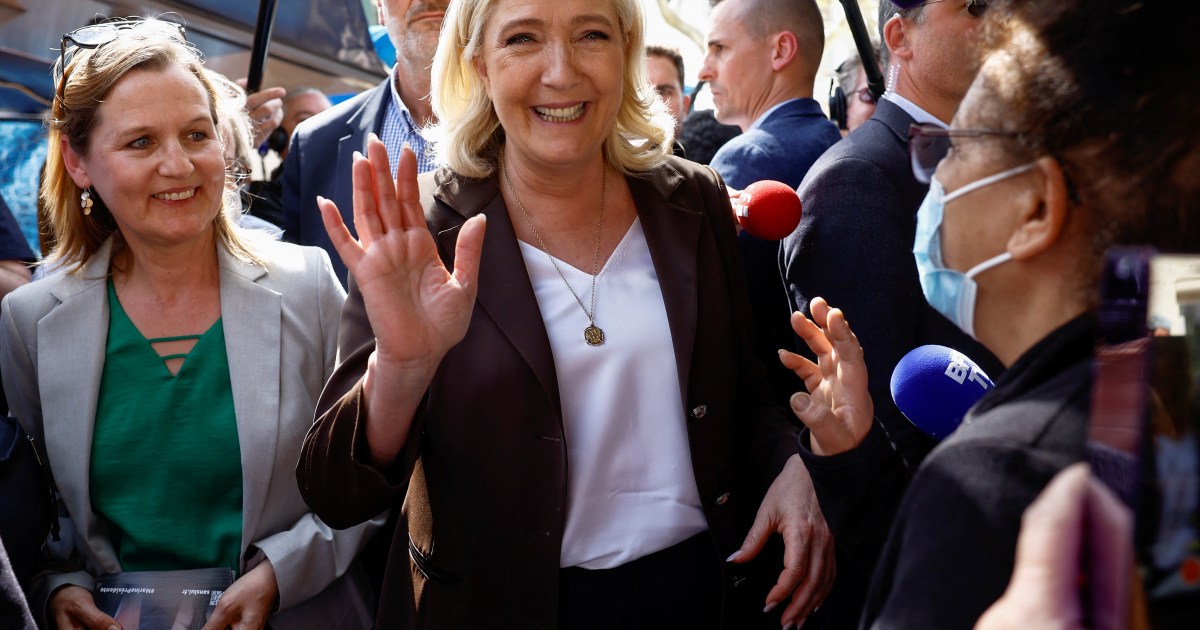PARIS -
The French presidential elections are receiving great attention from the member states of the European Union and the North Atlantic Treaty Organization (NATO), as France is the second economy in the 27-nation bloc, the only one with veto power in the Security Council, as well as a possession of nuclear power.
In a match similar to the return match, the leader of the National Rally, Marine Le Pen, will meet with President Emmanuel Macron again in the second round of the elections, scheduled for April 24.
In this round's itinerary, the far-right candidate is determined to alter her EU roadmap to align with current political requirements, but some of her electoral plans still include measures that contravene European treaties, and her potential arrival at the Elysee Palace next weekend could prove disastrous.
Frigate in another form
In contrast to her presidential campaign in 2017, Le Pen's proposals to leave the European Union and leave the single currency "euro", or "Freckit" - which means France's exit from the European Union - similar to the British "Brexit" - have disappeared, but her presidential program leads to an inevitable outcome of that. Through an anti-immigrant “national preference” approach.
In fact, Le Pen does not want to leave the "Schengen" area, which establishes the principle of free movement of individuals between the 22 member states of the European Union, as well as 4 allied countries, Norway, Iceland, Switzerland and Liechtenstein, and replaced her previous position on the need to renegotiate the agreement and control national borders.
In one of her speeches, she described al-Ittihad as a "intrusive and authoritarian bloc" trapped in an "open-frontier global ideology that destroys our identity."
She said her vision centers around an alliance of nations so that member states can "prefer their own business and restore permanent controls" on their borders.
Le Pen's sovereign and nationalist agenda also aims to create a "Europe on Demand" that will enable it to choose what it wants from the Union's legislation, on top of which is the issue of immigrants, free trade and defense, which completely contradicts the French commitment to European integration.
The right-wing candidate has on several occasions expressed her support for restoring the primacy of French constitutional law over European law;
"This allows France to reconcile its European commitment with the preservation of its sovereignty and the defense of its interests."
Macron had previously indicated, during his visit to Strasbourg, that the far-right project includes leaving Europe.
international scenarios
Officials in Brussels believe that the "potential President of the Republic" Le Pen will represent an existential crisis for the European Union, and will leave France's chair empty for 5 years, similar to the events of 1965 when then French President Charles de Gaulle boycotted European institutions due to budget problems.
Passing the right-wing candidate's platform would likely encourage conservative governments in countries such as Hungary and Poland, which have long been under European law, to engage in a fight with Brussels.
At the local level, French lawyers reported that the Constitutional Council, which is the highest court in the country, would reject Le Pen's plan to hold a referendum by presidential decree, while avoiding the need for parliamentary approval, because any referendum aimed at amending the constitution must have the support of deputies and senators.
NATO and Russia
In an apparent challenge to the Western security architecture in the post-Cold War era, the right-wing candidate dismissed the French position and NATO's arming of Kiev by declaring that France would abandon NATO's joint command if it won the elections, noting its quest to create a "strategic rapprochement" with Russia once the war is over and settled by a peace treaty.
It should be noted that the NATO Integrated Command is the main entity that manages the military deployment of the Alliance, under which member states put their soldiers at their disposal.
France returned to this military body in 2009 at the initiative of former President Nicolas Sarkozy.
The candidate of the National Front Party explained that her military diplomacy would lead to the end of US President Joe Biden's unified alliance in the face of his Russian counterpart Vladimir Putin, or at least to disrupt it, justifying this by fearing that "we will be dragged into conflicts that do not belong to us."
When asked about her suspicious relationship with Moscow when she borrowed a 9 million euro loan from a Russian bank to finance her 2017 election campaign, and about Putin's reception to her in the Kremlin, she said that highlighting this matter now is an "unfair trial".
european Macron
Unlike Le Pen, Europe is at the heart of Emmanuel Macron's electoral project, which focuses on 3 main points: ensuring energy independence in Europe through its dependence on alternative and low-carbon energies, ensuring technological independence through communication and sharing innovation among member states, and finally ensuring independence The strategy of strengthening the army.
The outgoing president also declared his desire to reform the Schengen area, "This is the area that we must not leave, as the far right proposes, but we must reform and better protect its external borders."
In the same context, Macron called for accelerating asylum files in European countries.
Despite Macron's lead over the leader of the National Rally in the opinion polls, the nominee is rushing to turn up for events across the country to make up for a lackluster initial campaign, at a time when the French far-right is closer to power than at any time since World War II.
In the event that Marine Le Pen enters the Elysee Palace to be the first female president to rule the republic, diplomatic papers will be scattered to write a different geopolitical scenario that will formulate a new formation for the features of the European continent.

